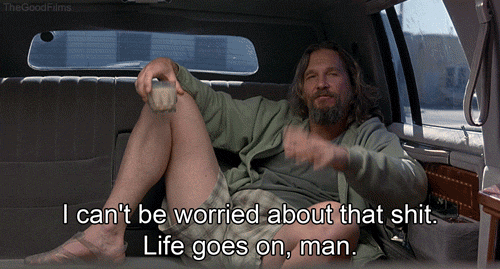1. One break, two breaks, three breaks…
Are in
class and you cannot wait hopefully for the next break? Is your lecture getting
longer and more boring than usual and you need fresh air or maybe a coffee?
Well, no problems. Just wait five more minutes and it will be break time again.
If you are studying in Denmark your lessons will never last for more than 45
minutes. Otherwise, there’s a break. It’s easy to get used to it, however, you
sometimes think “come on, just finish your lesson and we go home”.
2. Food or how to become a big ass in class
When you
start a new course you are aware of the fact that you won’t do too much. You
know, first day, new lecturer and you’ll take it easy. As if this were not comfy
enough, lecturers usually bring pastry, cake, croissants, maybe if you’re lucky
kanelsnegl as well, plus coffee, tea and bread. And it is that course
beginnings at Danish university are food festivals where you sit on your chair,
you eat and let your ass get bigger and bigger.
 |
| Yeah, laugh, but once you get into the Danish uni, you never know how's gonna be |
This is
related with the second thing you do if you study in Denmark. How come you
cannot eat in class if it’s the educational staff who brings food. Is your
stomach rumbling and you’re just back from the break? Don’t clench or lean your
body to hide the noise. Just open up your tupperware and eat a sandwich or
something more elaborated, if you are foreigner, or you bunch of carrots if you
are a Dane. You are making noise when chewing but God knows that it’s more
polite than your “roars” and “burrs” of your stomach.
4. Go easier or go home
If there’s
something in the Nordic countries, and well Germany too, that they can boast
about and it’s still true, it’s order. They are organized and one can see it
from the beginning. In your first day of course they give a paper with all the
deadlines throughout the term. You realize that you have to plenty of time to
write all your essays, all your assignments and occasionally a project. You
don’t live in permanent tension as you would do some circles of latitude below.
Write a 5-page assignment in a week. Deal! I don’t have lessons every day.
 |
| He can be one of your classmates, or even one of your lecturers or professors |
The end of
the term is coming. For other countries it is like that so-repeated quote from
‘Game of Thrones’: “Winter is coming”. You can’t run away, you can’t avoid it.
It’s fate and it’s fated. But in the country where the real winter is coming,
and not the one with those soulless white walkers, this doesn’t seem so
terrifying. I mean, of course you tremble and you’re likely to smoke a
cigarette before the exam, but, as I said: exam. Ok, maybe they have two or
three exams. It’s cool and I love it because I don’t see myself studying for
one, and another and another exam until 6 exams in a chain. In Denmark you
don’t end up with anxiety, bald because of the stress or with a corn on the
finger of so much writing schemas. But they have more creative ways of
examining you, like oral test. They love oral, I guess so.
6. You type, not write
Did we say
corn on a finger? Yes, because getting inside a Danish classroom at the
university means to see everybody with a computer. There are no papers or pens,
but laptops and chargers and maybe some iPad. As well, one can detect who’s
Danish, who’s not. It’s like playing ‘Guess Who?’ or ‘Who’s who?’ but with just
a simple question: Does he/she have a Mac? If so, it gets a 90% of probability
of being a Dane. But this is irrelevant, the thing is like they’re so damn used
to typing, that they don’t remember how to write. How beautiful is to handwrite!
But beauty has a price. Well, if you don’t want to pay it, Denmark is your
place.
 |
| If you are a Dane, Apple is your religion, your typings on the keyboard yours prays to God and Steve Job... Who remembers him? |
Do you
remember that scene from the film ‘300’ when Leonidas kicks on the Persian
soldier’s chest while screaming “This is Sparta!”? Well, something similar is
going to happen if you ask a Dane why they have so much coffee all over the
uni? “This is Denmark”, they’ll say to you while kicking out of the student
room kitchen. Coffee vending machines, coffee makers, coffee pots, water-heaters,
and well, the canteen. What we like: cheap coffee to stay awake. What we don’t
like: It’s dirty water, thank you. You’d better make stronger coffee you
wouldn’t have to drink coffee every hour and to piss consequently as if you
were a mare.
8. Where do you live? I live at the uni.
But why so
much coffee? To stay awake while you are at the uni, but they like to spend the
day. University is like a casino. You never know whether it’s daylight or
nighttime in order you keep on betting. Here it’s the same. The best examples I
know are Copenhagen Business School library and cafeteria and Syddansk
Universitet in Odense. As far as I know, I just want to go home once my lessons
are finished. There’s no need to stay on the campus for longer. But there’s
something in the Danish universities that attract you. Why to do nothing at
home, when you can do it at the university. And this casino style of
non-getting outside is mirrored also in the fact of having showers in the
toilet. No, I don’t mean the gym toilets. I mean an average toilet. It’s just
like “I go to pee and… wow! There’s a toilet, it’s still wet!”.
 |
| Syddansk Universitet endless corridors. Too long way to say "I'm going home". Flickr: SANTIAGOCOMS.1 |
It’s Friday
afternoon, almost evening. Lessons are over and you don’t wanna go home yet.
You know, you love to live at the university. Let’s go to the Fredagsbar.
“What’s that?”, the foreign student asks. Well, every Friday there’s a bar,
with music –yeah, music– and very cheap beer. It seems a tramp. Well, if you’re
meeting your friends in the city later it may be. You’ll not be able to crawl
back home. And the best thing is that the day when the Christmas beer
(Julebryg) and the Easter beer (Påskebryg) are released you can wait in the
Fredagsbar to have your first drink of those beers.
10. Party in the house, well, party in the
university.
 |
| It's not like this... Well, not at the beginning at least |
Let’s keep
on talking about what I like the most, party. Certainly one could think that
there’s nothing better than having a Fredagsbar where one goes wild but still
on the campus. However, you’re completely wrong. Danish universities hold the
semesterstartsfest (beginning of semester party) and the årfest (annual party).
It’s crazy. Universities hire DJs and bands, set lights and speakers, put
hotdogs and Asian food kiosks. It’s a like to be in heaven, but surely you know
how much you’re sinning there and that could be hell. A big reason? Toilets in
the Danish universities are mixed, for girls and boys.

